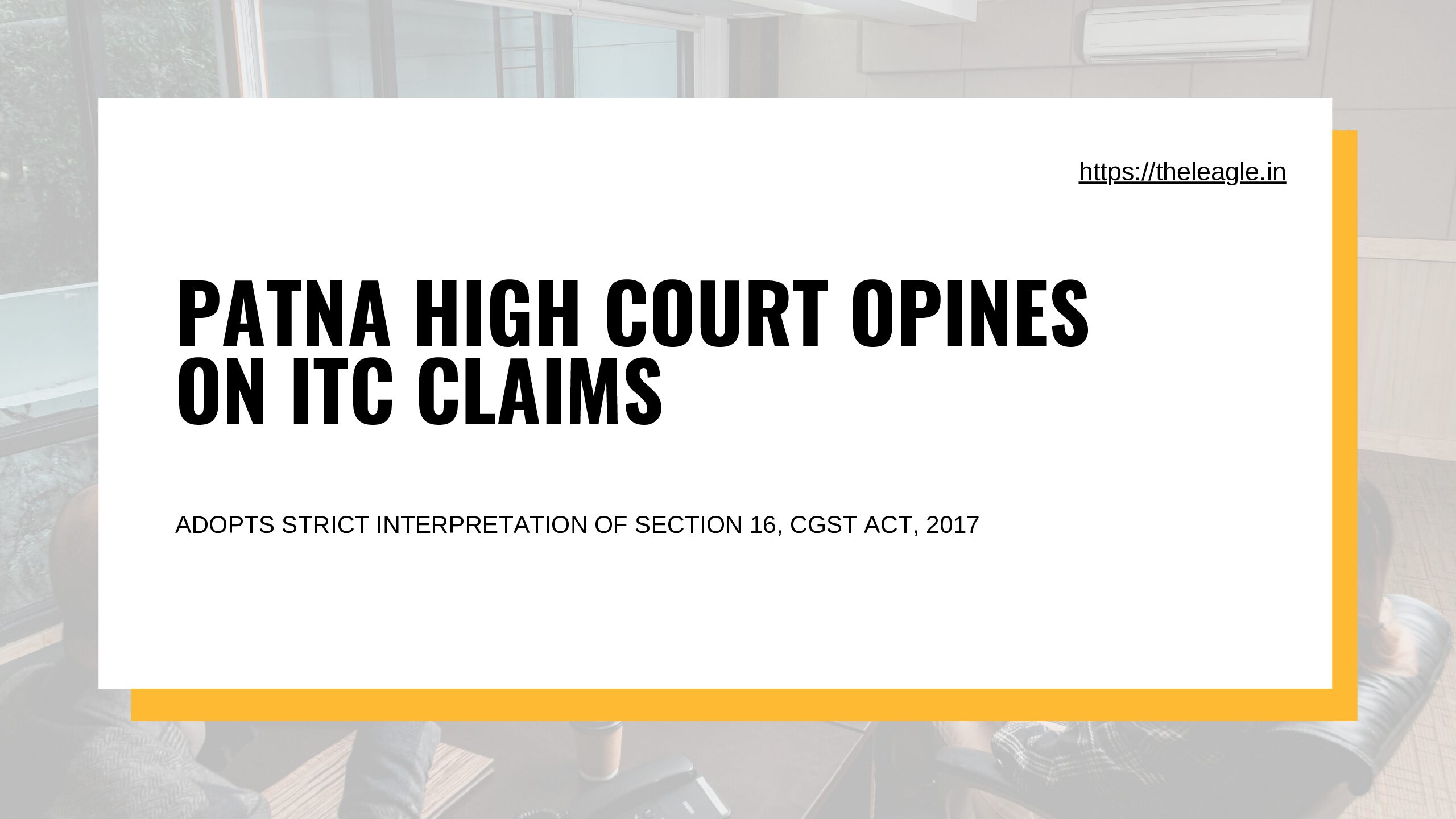In a recent judgment[1], the Patna High Court engaged with the issue of whether a claim for Input Tax Credit (‘ITC’) is sustainable when the purchasing dealer has made the tax payment to the seller, but the latter does not pay tax to the State. The issue of non-payment of tax by the seller and its impact on purchaser’s ITC claims has arisen frequently under pre-GST and GST regime, with no clear resolution. Recently, the Calcutta High Court – where issue of GST returns was central – opined that the Revenue should first proceed against the seller instead of reversing the ITC of purchaser. In the impugned case, the Patna High Court adopted a different approach where the ingredients of Section 16, CGST Act, 2017[2] were central in deciding the impugned case.
Introduction
The purchasing dealer claimed that the seller has not paid tax to the State despite the former making the payment to the latter. As per the purchaser, the liability of purchaser stood satisfied on payment of tax to the seller and the State seeking to recover the said tax from the purchaser would amount to double taxation and diluting the rationale of ITC, i.e., prevention of cascading effect of taxes. The State, on the other hand, argued that the conditions prescribed in Section 16, CGST Act, 2017 need to be satisfied for a taxpayer to claim ITC successfully.
The purchasing dealer tried to argue that the Supreme Court’s observations in ECom Gill Coffee case[3] that the purchaser had to prove ‘prove beyond doubt’ the genuineness of transaction in question to claim ITC was inapplicable in the impugned case since the said case was decided under the KVAT Act. The Patna High Court agreed with the argument but noted that the inapplicability of the ECom Gill Coffee case would still not absolve the dealer of the requirement under Section 16(2)(c) which requires payment of tax as a pre-condition for successfully claiming ITC.
Patna High Court Mandates Compliance with Section 16
The Patna High Court while emphasizing that unless the purchaser satisfies the conditions prescribed under Section 16, cannot successfully claim ITC made two observations that are important to highlight as to how Courts struggle to categorise ITC. For example, the High Court first observed that the condition under Section 16(2)(c) requiring payment of tax via cash or ITC is a burden:
This in effect is a burden of proof cast on the purchasing dealer who claims Input Tax Credit, which is a right created under statute; sustained only under the specific terms of the statute. (para 10) (emphasis added)
In the following paragraph, the Patna High Court observed that ITC was a benefit conferred by the statute:
Necessarily, the conditions for such availment of credit has to be scrupulously followed failing which there can be no benefit conferred on the assessee. The benefit is one conferred by the statute and if the conditions prescribed in the statute are not complied; no benefit flows to the claimant. (para 11) (emphasis added)
The prima facie effect of observations in the above paragraphs is that ITC is both a right created under the statute and a benefit conferred by the statute. In my opinion, it is important to categorise it one and unambiguously so; it would determine the extent and nature of conditions can be imposed on taxpayers before they can successfully claim ITC. Courts through casual remarks on the nature of ITC, such as in the impugned case, only add confusion instead of conceptual clarity.
Conclusion
Nonetheless, the Patna High Court was categorical in conclusion that ITC postulates that there should be credit in ledger of the purchasing dealer and the said credit can only arise once the seller has paid the tax to the State. Mere production of invoices by the purchaser is not sufficient to claim ITC. Strangely, though the High Court noted that purchaser and seller have an ‘independent contract’ without junction of the Government. But it nonetheless noted that the purchaser’s claim of ITC is dependent on seller paying the tax, a statutory condition under Section 16(2)(c). In other words, the purchaser must either ensure that the seller fulfils its statutory obligation of paying tax to the State or be at the mercy of seller. Because the purchaser cannot successfully claim ITC until the seller pays the tax. Thus, it can also be said that Section 16 is an in-built condition in the purchaser-seller ‘independent contract’ for the purchaser to claim ITC.
While the State claiming that conditions of Section 16 need to be strictly fulfilled for a purchaser to claim ITC is valid, what is unsettling and legally indeterminate are two things: first, if the State can impose such a statutory condition? The answer to this question would be partially supplied once we have judicial clarity on whether ITC is a right or a concession, for in the latter case such onerous conditions could be justified; second, it is unclear if the seller acts an agent of the State or purchaser once it collects the tax? In my opinion, only in the latter case is it defensible to make the purchaser’s claim of ITC dependent on seller paying the tax. Otherwise, it is not far-fetched to say that conditions under Section 16 are aligned to the State’s interest rather than a coherent conceptual approach towards transactions and the parties that generate GST.
[1] M/s Aastha Enterprises v The State of Bihar 2023 LiveLaw (Pat) 96.
[2] This provision is pari materia with Section 16, Bihar Goods and Services Tax Act, 2017, the impugned provision in this case.
[3] State of Karnataka v M/s Ecom Gill Coffee Trading Private Limited 2023 SCC OnLine SC 248.
